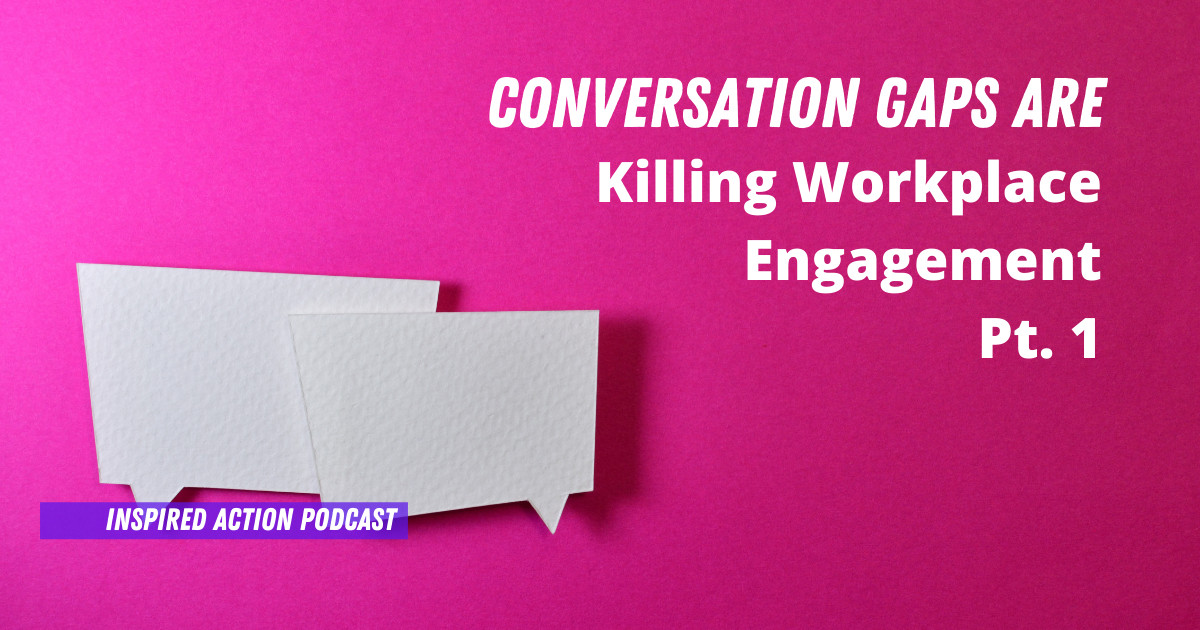“Conversation Gaps Are Killing Workplace Engagement – Part 1” Brief Summary:
Difficult conversations. Are you having the difficult conversations in your organization? Or are there conversation gaps? Did you know not having difficult conversations in the workplace is actually killing team and employee engagement? In part one of this Inspired Action For Imperfect Humans podcast episode, Hosts Kyle Kalloo and Christopher Lawrence discuss difficult conversations, why you should have them and stop avoiding them.
“We know by being conflict avoidant, or even just avoiding conversely, like even asking for what we want, because we’re avoiding rejection. We know that it creates stress and anxiety in people’s lives.”
Summary:
- Introduction
- What is avoidance versus lazy?
- Difficult conversations, why we need to have them?
- Kyle tells a story about a recent client who was avoiding a difficult conversation.
- Kyle and Christopher discuss the statistics around difficult conversations
Calls to Action:
Even before the remote workforce evolution, office culture was inherently fragile. After all, it’s made up of imperfect humans interacting with other imperfect humans. And while perfection isn’t the goal, we all secretly wish for a workplace where people find ways to bring out the best in each other. Unfortunately, that’s not always an intuitive skill. It takes guidance, practice, and then more guidance and practice… but with the right leadership, it’s definitely achievable. How do you enhance your workforce’s ability to engage, collaborate, and adapt in this volatile and uncertain reality? Get the answers to your culture questions when you setup a complimentary Discovery Session with Kyle Kalloo at https://ChangeMyLifeCoaching.as.me/?appointmentType=14623413
Not loving your career? Feel you need a change in your job? Let’s Strategize! Book a complimentary Strategy Session with Christopher Lawrence here: https://ChangeMyLifeCoaching.as.me/?appointmentType=14044176
Tell us your “inspired stories” stories by visiting www.InspiredActionPodcast.ca
Christopher Lawrence LinkedIn: https://www.linkedin.com/in/career-life-coach-christopher-lawrence/
Kyle Kalloo LinkedIn: https://www.linkedin.com/in/kyle-kalloo/
Change My Life Coaching & Change My Business Coaching LinkedIn: https://www.linkedin.com/company/6446498/admin/
Looking to create a corporate coaching culture? Reach out to Kyle Kalloo: [email protected]
Website: https://strategicleader.ca
“Conversation Gaps are Killing Workplace Engagement – Part 1” Transcript:
[00:00:00] So, so I came across this research seven in 10, uh, north American workers are avoiding difficult conversations that. Really seven in 10. So I knew it was high. I didn’t think it was that people would rather keep quiet on an important work issue than tackle it head on is the thought of being imperfect, keeping you from taking action.
Welcome to inspired action for imperfect humans. Each week, we give you real life stories and thought provoking research that inspires your soul to live a more fulfilled life through your own actions from the heart. Calgary Canada. Here are your hosts. Award-winning coaches, Christopher Lawrence and Kyle Kalloo.
Well, good morning. Good afternoon. Good evening. And good nights. It doesn’t matter where you at. Just hello? Hello. Hello. How you doing today? I am actually fantastic. I’m feeling kind of [00:01:00] casual, which is not usually like me. So I think you’ve kind of done today in the outfit, but I feel like when you say casual, it means lazy.
No, there was some effort. There was some effort this morning is just freezing, uh, in Calgary, Alberta. And so I felt like I needed something warm. unlike you, I don’t have anyone that keeps me warm at night. Right. So I just kind of have to do that myself. So I have been married for long enough that, that doesn’t, that no longer applies to me.
I’m sorry. My husband doesn’t listen to this podcast.
Is that what marriage is. I can sell. It happens. Wonder why I don’t do it. That’s a [00:02:00] different podcast that does not fall into the criteria for this show. Wow. Hello everyone. Thank you for joining us. We’re really excited, you know, season four and loving it. Um, so what are chatting about. Once again, because you are casual how shake lazy and didn’t come prepared.
I thought maybe we could actually talk about avoidance. Um, but in a very specific, in a very specific way. Yeah. So actually, um, I, I have lots of clients kind of like. I, you probably get this too, where it’s like, they might label themselves as lazy. Now almost like a diagnosis. I don’t really believe in lazy though.

I think lazy means avoidance and avoidance is usually about avoiding something that causes pain and pain might be too strong of a word for it. But, um, but pain is, is a good word for it, right? So like, like we might avoid doing the dishes and because. You know, doing the dishes feels more painful than sitting down and watching [00:03:00] Netflix.
And I think you’re right there is that the connotation that we usually attach to it is lazy. Like, listen, cause sometimes you’ll hear your significant other or I don’t know. I may or may not have heard my parents say this is like, stop being lazy. Go and do. Right. Go wash the dishes. Why are you so lazy?
Let me do everything. In fact, I think you’ve called me lazy a couple of times when I’m doing a certain thing, you’re like stop being lazy. Come on. Let’s just pick up the pace. And I’m like, that’s probably really unlikely cause I don’t use that word. Oh, well, I’m sure I’ve heard it somewhere, but I think you’re right.
It’s just, this is what happens. And sometimes I, yes, and I would have a client that says, I think people on my team are lazy and I would always ask, well, what do you mean by that? What are you so skating with the word lazy? Because we need to get to how are they defining it? Because if you say that to an employee, if you say that to a colleague, I am sure you’re going to get a reaction because anyone is going to even identify.
And if they do identify themselves as lazy. [00:04:00] We don’t think it’s that either. Well, that’s I agree with you. I think that underneath lazy, there’s more, that needs to be explored. And I think a lot of folks don’t explore it, but so, so on the topic of avoidance, I would like to talk about having difficult conversations.
Um, like in general or with me, are you talking, you know, the, I’ll tell you something though. This is something that you and I are very good at because we do not avoid difficult conversations, um, at all. Um, And, and it’s because we know he tried the someone’s going to call it out. So it’s not long. Yeah know, like within minutes.

So I think this is really important. And I’m going to tell you why Canada is in a labor shortage. The United States is experiencing the great resignation. Canada, according to BDC is not experienced. As much of the great resignation, uh, as the us is [00:05:00] Canada is actually in a different position where we do not have enough people for the jobs that are out here.
So this is a really good opportunity for employers and employees to have difficult conversations about what they really value and to not be afraid to ask for what you want on either side of this table. I want to talk to you about this. Cause we know by being conflict avoidant, or even just avoiding conversely, like even asking for what we want, because we’re avoiding rejection.
We know that it creates stress and anxiety in people’s lives. We know that. And so our big, our big phrase, Kyle, is like, if you, you know, have a client, I have this client, okay, I’m going to call him Jeremy. I don’t actually have a client named Jeremy, but, but I’m going to call him Jeremy. Jeremy, this is what we’re working on.
Jeremy constantly says, I don’t want to rock the boat. I don’t want to rock the boat. Or I hear things like, well, if they don’t know, then why should I say [00:06:00] something now they should know, or I’ll hear the phrase. Um, uh, Well, there’s no point in saying something now, or I don’t want to put a target on my back.
I don’t want to be that person. I don’t want to be the squeaky wheel. Well, so the reason why I’m saying all these catchphrases is because these are some of the most common ones that we hear. So if you’re listening to this and you resonate with any of those, you need to finish this episode because there’s some really key stuff in here that we’re going to talk about.
How, what, what experiences do you have specifically? Story-based. Girl, you see, do you all see how I need to control him and keep him in line? You know, I was thinking about what you were saying, and I, because we do these, these types of workshops as well in the breakouts and the discussions that we have, you know, And I, I usually am the one who brings us to the forefront because I know people are thinking about it.

Sometimes people avoid these conversations or [00:07:00] potential robs or riffs and all this other stuff, because for some people, they had an experience where they thought they were being open and honest. They wanted to give feedback. They just saw something that someone, whatever, and they have this conversation and it backfired.
Right. And then now it just left them really? Like, what do you mean, well, what about you? You never do this. What? Right. And it’s just like, oh, I’m just telling you that sweater didn’t look good on you. That’s all. Well, what about right? And I think sometimes there’s this, this thing that happened in the past that we sent a hold onto, or we may have heard about someone else’s.
Right where they’re like, well, I’m just doing this for you. I’m not, there’s something about it for us as well. So I think, you know, because of who I am, I’m usually forthcoming. I’m usually more direct. I find that some people, you know, later on, I heard they were somewhat intimidated by it. And so they would avoid having conversations with me.
And I wouldn’t think that things were going great. I didn’t know any different, I would [00:08:00]just move on because for some people they, you know, um, they didn’t want to have a conversation. So for those people who said, well, I should have known right. To some degree. There’s certain things I could have known about, but there’s times where I didn’t know.
How would I know I disagree with that. I don’t think they should have known it is anything. If somebody doesn’t know, they don’t know. Like, I’ll tell you why, you know what? My, my coach said something really powerful this morning. He said, um, uh, possibilities never lead to disappointment, but expectations will or expectations can.
And I just thought to myself, that’s so true living in possibility. Cause possibilities are not expectations. Right? So if you live in possibility and I think this is the same of difficult conversations and, and I think that, um, So often we’re living in expectations about what we want the outcome to be.
And actually as a result, we just avoided Canadians in particular, you [00:09:00] know, I’m going to pick on our country for a second. If we’re stereotyping people, because I have coached a lot of immigrants. A lot of immigrants and there’s a common thread, which is that you can’t really say anything to a Canadian without offending them.
Right? Like, like Canadians are afraid of like pure honesty or brutal honesty, right? Like they’re, you know, they, they take offense to it. And so we, we try to kind of like, you know, coach these people until you can’t say that here kind of thing. And I was like, okay, that’s fine as part of our culture. But I, I do think it’s a problematic part of our culture.
You know, it’s great that we’re so kind to each other and that we apologize to each other. I think it’s a problematic part of our culture. Here’s the interesting thing. I came across some research. So I’m going to get into some of this research. I’d let Kyle chime in, but he’s currently closing his blinds because once again, he didn’t come prepared to this meeting.
So he’s muted himself and now I get to bash him. Okay. Before he comes back, let’s go back to, Hey,[00:10:00]
sorry. Jesus see needs an opportunity. There’s no avoidance here. People where there’s an opportunity to get a jab in boom. He’s there. He’s there. Well, I mean, come on who doesn’t think to close their blinds before they get started? You know, the funny thing is, is that it’s about five minutes away from hitting my window.
Just cause the angle of the sun. So I’m hoping that we’ll be done this podcast so I can close it before we record the next one. So we got to get going here. I am tickled by myself today. So, so I came across this research seven and 10, uh, north American workers are avoiding difficult conversations.

Really seven in 10. So we knew it was high. I didn’t think it was that people would rather keep quiet on an important work issue than tackle it head on. [00:11:00] I mean that just, I mean, I’m not really surprised, but I still in the same sentence, I still find it mind blowing. Cause you look at how much we deal with it as coaches and helping people have these conversations and, and people are, are, you know, afraid of retribution or rejection.
Right? And so this is what prevents them from speaking up at work. These are the top two reasons that people are, are not speaking up at work with. Um, uh, with their employees or sorry, uh, with their leaders. Right. And so it’s, it’s really interesting to me because rejection, by the way, there’s a great book.
We are not getting paid to do. This is just a book that I read. That was absolutely life-changing in this regard, it’s called rejection proof by Jai Jiang. J I a space, J I a N G. Book called rejection proof healed. So has a Ted talk. Everybody needs to watch this. If you’re afraid of rejection, I can tell you, I have, um, I have clients right now that are actually asking for what they want and they’re getting it.
And I [00:12:00] think as we step into this labor shortage, that Canada is going to have for a number of years, if something doesn’t intervene and even these interventions are going to take too long to put into place. As, as that happens, it’s going to be really important for people to learn, to have difficult conversations, because you’re going to need to set boundaries because you’re going to be overworked and you’re going to think that money is going to solve the problem.
And yet I think that you should take advantage of this and ask for more money. I think. Corporations have had the advantage for a number of years, you know, it’s like due to economic downturn, they didn’t give bonuses due to, um, due to, you know, I look at some of the companies of clients we coach and those in our families and, and it’s like, their companies will have their very best quarter.
They have their very best quarter and. Or there or a record breaking year. And they’re like, well, due to COVID no bonuses, no raises. And I’m like, that’s bullshit. [00:13:00] And so find they’re doing what they’re going to do. That’s the nature of business. Keep the shareholder happy, keep the board happy, let the CEO get their bonus.
But now we’re coming into a time in Canada where people are going to have the opportunity. So sure. Go check the money box, but don’t just make it about money. You need to be focused on life and lifestyle because well, because money comes and goes and, and, and as inflation. Job shortages create inflation because people do get paid more.
And so what’s going to end up happening is that all that extra money you’re going to make, isn’t going to equal to a whole lot more in your pocket or savings account at the end of the day. So my suggestion is, okay, go check that box, but then focus on the other aspects of your lifestyle. So this is the reason why I wanted to get into this today.
I want to, I want to point to a couple of other things out Kyle, from this article. Can I do that? Do you have any comments? No, no, I, I hear you. And I think that’s the thing is every time we do a survey, every time we do an employee, whatever money has never been the thing of the top of the list, [00:14:00] because it’s not sustainable.

There’s people who make a lot of money, not happy, not engaged, not connected. Right. So I get it when you don’t have money, you need it. Absolutely. Right. It’s when you have it. What’s sustainable. Totally. So if we were to dub this, we might call it a conversation gap. And what this conversation gap is leading to is decreased engagement, loss of productivity, higher turnover, right.
And what ends up happening is the employees end up becoming consumed by their issue. And they will actually quit before they’ll speak. Yeah, here’s the crazy thing. I mean, this is mind blowing to me because it’s like, as we’re heading into this, everybody needs to get on board with this. This is part of what we do.
We do offer programs on mastering difficult conversations, negotiations, and the rest of it. Folks need to get on board with this Kyle, because, because without it, Kyle, you had an example this week of somebody who was avoiding a difficult [00:15:00] conversation. Do you want to, do you want to share that story? And then I’ll share because managers are actually dodging these conversations too.
So I want to share that. So w which one are you referring to? Well, why don’t you choose one of the 17 that you’ve had this week? Because you’re such an ego monger with an inflated head who could barely get his head through the door this morning. I don’t know, pick one, which one to him,
leave him out of this. Cause this is you. Well, you had somebody that was avoiding having the money conversation about their salary. That one. Yeah. Yeah. Okay. That would be a money conversation. I dunno. Yeah. So, yeah. And so one of the things in cause, and sometimes in the coaching with a client, we talk about what does that look like?
And there’s a, a few strategies with their employers, right? And one of the things that they wanted to do was based on their contribution, based on the responsibilities, based on their accountability, which is really what you [00:16:00] should be paid against, not just task. Um, we really found a number that makes sense. And a person said, well, I don’t want to really ask because if I asked, I’m going to come across, what if I come across greedy?
What if I come across that other people are not doing other things? And I said, listen, it’s not about that because right now, if you don’t ask, it’s a hundred percent no. If there’s no ass, I can tell you right now it’s no. And then you’re going to be resentful. Then you’re going to think I’m doing all these other things and you’re going to go on and on.
Are you going to think they should know? And I’ll tell you from being in those position, I don’t know that that is your number. That is what you feel is what’s necessary for you. Right? And so we structured a conversation on how to be effective about asking it, but it’s really about getting through the stories.
We sometimes tell ourself in this process. Sure enough through some work and through some strategies and tactics that we worked on, the person finally had the conversation and I found out, uh, yesterday afternoon they [00:17:00] got it. But did they get. They got a salary of 110 K from mass from 75 K. So that was a massive amount, but they were able, and again, and the person, you know, their employer was actually even saying to them, you know, yeah, we, we needed to do this and, you know, and they were kind of feeling like they were giving them.

Yeah, we did that for you. Like yeah. You know, but they really said, you know, I really appreciate the things you said. I see those additional value and we really want you to be in the organization because that’s, what’s up. Their employees want to feel valued and employers want to value their employees, but sometimes they don’t know.
And if you’re not. You’re not getting an opportunity to have that conversation of the other side of progress. And we find every time there’s a conflict. It’s I shocked if I hear differently, but there’s usually progress on the other side. [00:18:00] Well, yeah, I mean, there’s, it’s interesting. Right? So actually what they’re finding is that managers are dodging.
The conversations as well, and that’s across all industries, all company sizes, all kinds of managers is that they’re actually there. They actually know that sometimes the difficult conversation is going to happen and they admit to avoiding it really admit to avoiding it. Here’s here’s who it’s affecting highly, certainly it’s affecting, um, uh, minority groups so that they’ve identified POC.
Yeah, as well as women, but specifically LGBTQ plus community, we’re more likely to struggle with 80% of that group reporting difficulties in this area stating that they could not, they could not show up as their full selves at work. Because it is a different language. It is a different [00:19:00] culture. Yeah.
Before you continue about showing up, can you show up in this video because I can’t see you right now with the sun. I mean, I just have to close my blind. I’m just saying, I just want know if you were prepared for this. Visual girl. It’s not my fault that my personality just radiates angelic. If you managed to get on our YouTube channel, my whole face is white.
If you’re watching this on YouTube right now, you should see him. He’s dodging the sun. He’s like trying to find the little angle where there’s no sun and it’s just in between and he’s talking and he’s navigating. And so now it’s my turn to say, listen, look at this guy. He wasn’t prepared. He was so quick.
With judgment. Right? And now this go do the other word. See that
came back and he’s like, damn, I still can’t see myself.[00:20:00]
So speaking about showing up, this is what it looks like, guys. I appreciate you guys. I came prepared, but somebody must’ve come in and open these blinds when I wasn’t looking. Yeah. In between a blink, someone came in anyway, continue. I don’t even remember what we were talking about. So these about, so here’s the thing that the, um, What they found, even in, even in small business and startups, 70% of people working in these organizations, uh, in startups and 78% of those, uh, uh, companies with more than 10,000 employees said that they were.
Avoiding tough conversations compared with around 60% of people at medium-sized companies. So there’s something about the medium sized companies. That’s a statistical significance, 17 to 18% difference. I think [00:21:00] part of it, some people see it as lack of access to HR that this is what they’re assuming. I actually think it’s a different reason.
I think it’s because we are trying to keep, you know, it’s like, well, don’t take it professionally, personally. It’s all business, you know, stick to the facts, blah, blah, blah. And I, listen, I agree. Stick to the facts, that kind of thing. But if you don’t recognize that it is an emotional human experience, then you will never have people need to feel safe, that they can have conversations with you, which means that you have to lead that way.

You have to say things like I’m feeling a little bit vulnerable right now. And here’s why, because I have to have a difficult conversation with you. Right? What that does is it opens up the door, you cannot avoid the feeling part of it. Um, the whole stick to facts, you know, and, and, you know, it’s interesting because in some of the research they’re talking about, um, HR.
Less than 20% of people said they would go to HR. The truth is, is that HR is not actually trained for this reason. HR serves a different purpose. [00:22:00] Think of the HR is more like human capital, right? That’s what it is. HR is not intended to be there for coaching people, get into HR thinking that they’re going to valid like that.
They’re going to validate their own. You know, their own perspective or getting in, in between it all right. They think that’s an HR thing because leaders are sometimes not having the conversation because they think HR has to have the conversation. And HR is like, it’s your team? You’re leading them.
You’re the leader. Why are we getting involved? Right. So, so what can people do this? So we hear the problem. We know the problem. We know people avoiding. We know people at all levels, all generation, all organization, there’s avoidance. This the, the numbers might be a little bit different depending on how the size of your organization, but for whatever reason, it’s not happening, we know as coaches why, you know, it needs to happen.
And which is why we work with the clients that we work with, or when we’re invited into organizations to help their teams deliver it because we get it. Some leaders are not equipped. Right. And that’s why, you know, we come in and to [00:23:00] help them do that. And also that individual in independent source. Cause that the feedback we usually get is because you guys are not a part of the organization, they tend to trust a little bit more or we get a little more latitude in the conversation about able to help them through it.
Right. So what can people do? Well, I think that there’s a formula that we could talk about here, Kyle. And I think what we’ll do is we’re going to two-part this episode again. So what I’d like to encourage people to do is stay tuned next week. We’re going to pick this up again in the short term. What I want folks to think about is consider viewpoints beyond your own.
Right and plan for your desired outcome plan for your desired outcome. We don’t enter any project or goal or professional or personal without saying, this is the desired outcome. Why do we enter conversations without that? When you, when you define your desired outcome as a win-win, you walk in that’s then how you have the conversation, but we need to continue this conversation on our next [00:24:00] episode, because I think that the problem is more global and systemic organizations or.
Are, uh, are doing this. They’re trying to teach people, but they’re not creating cultures of accountability and they’re not addressing the real issue, which is the fear that people have around rejection and a punitive environment. So that’s where we’re going to pick up next time. Great. So guys stay tuned and remember if you’re not following us on our social media is, uh, you definitely want to do that.
The show notes, we have additional information in there as well, share subscribe, and like this, we really want our goal in 2022 is to really hit that 10,000 download mark, where if you away from that, we’re about 3000 or something like. We only hit, we only have to get a 9,996 more downloads. Brilliant. All right.
So make sure you are sharing this and let us know if this is helping, because we promise this year to go even deeper, which is [00:25:00] why we want to continue the conversation we’ll see you soon. It’s our goal to build a global community of inspired action takers, and we can only do that with your help. So if you love inspired action, please leave a review on your favorite podcasting app.
And your socials you’ve heard from us. Now, we want to hear from you go to inspired action podcast.ca and tell us what is the inspired action you took this week next week on inspired action for imperfect humans. If you’re a co-worker, I’ll tell you what toxic workplace includes gossip. I should know I got involved in it and caught up in it and some really bad ways a number of years ago.
And it is toxic. It’s not just creating a toxic work environment. Destroying your psychology.



